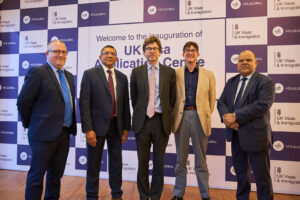Artificial Intelligence (AI) has offered countries, such as Nigeria, the chance to tackle traditional development challenges.
The Minister of Communications, Innovation and Digital Economy, Dr Bosun Tijani, made the assertion on Tuesday in Lagos.
He said that AI was not just another technology trend, but a significant catalyst of change.
Tijani spoke at the opening of the Global Inclusivity and AI: Africa (GIAA) Conference, in Lagos.
The conference was a partnership by the U.S. Department of State and the Nigerian Ministry of Communications, Innovation and Digital Economy.
Tijani said that AI could transform education by personalising learning experiences, improve financial inclusion through innovative internet solutions, and enhance governance by making public services more efficient and accessible.
“To enhance Artificial Intelligence for collective benefit, we must be deliberate and collaborative in our approach.
“We must ensure that the digital transformation journey is inclusive, equitable and human-focused.
“This is why, as governments, we prioritise adoption of an open and inclusive approach to the development of our national AI strategy,” he said.
Tijani said AI had the potential to revolutionise healthcare by diagnosing diseases more accurately.
“Artificial intelligence is not just about its development, but also about ensuring that every Nigerian, regardless of his or her location, socio-economic background, age or gender, has access to opportunities that AI offers.
“As technology continues to evolve, it empowers the society to address complex problems with creativity, efficiency and unprecedented leverage, ultimately paving the way for the most equitable future,” he said.
At the event, Tijani announced the launch of a N100 million AI Fund, in collaboration with the National Center for Artificial Intelligence and Robotics, and Google.
He said that the fund represented the commitment to nurturing the next generation of AI-driven solutions.
He urged stakeholders to continue to collaborate to build a digital economy that would be resilient, sustainable and inclusive.
The U.S. Deputy Secretary of State, Kurt Campbell, said that AI could play a significant role in achieving Sustainable Development Goals in Africa, offering solutions to some of the most pressing challenges.
Campbell said the African Union’s landmark AI strategy set the roadmap for African countries to harness AI’s potential to achieve developmental aspirations in education, health, agriculture, infrastructure, peace and security, and good governance
“By developing human capital and strengthening research and innovation ecosystems and building an AI-ready, institutional and regulatory environment, we can help AI work for Africa.
“We aim to foster collaboration between the U.S. and African AI researchers, policymakers and industry leaders, so that we can work together to drive innovation and address common challenges,” Campbell said.
Dr Seth Center, Acting Special Envoy for Critical and Emerging Technology, U.S. Department of State, said that governments had roles to play in channeling and shaping the technology revolution.
According to Center, AI is just one part of a larger vision of digital solidarity that stakeholders are partners in.
He said that technologies, including AI, had to be used in a rights-respecting manner to ensure a secure, resilient, self-determined, and prosperous world driven by innovation.
“For President Biden, this is part of a digital transformation of Africa initiative to expand digital access, increase literacy and strengthen enabling environment across Africa,” he said. (NAN)

























